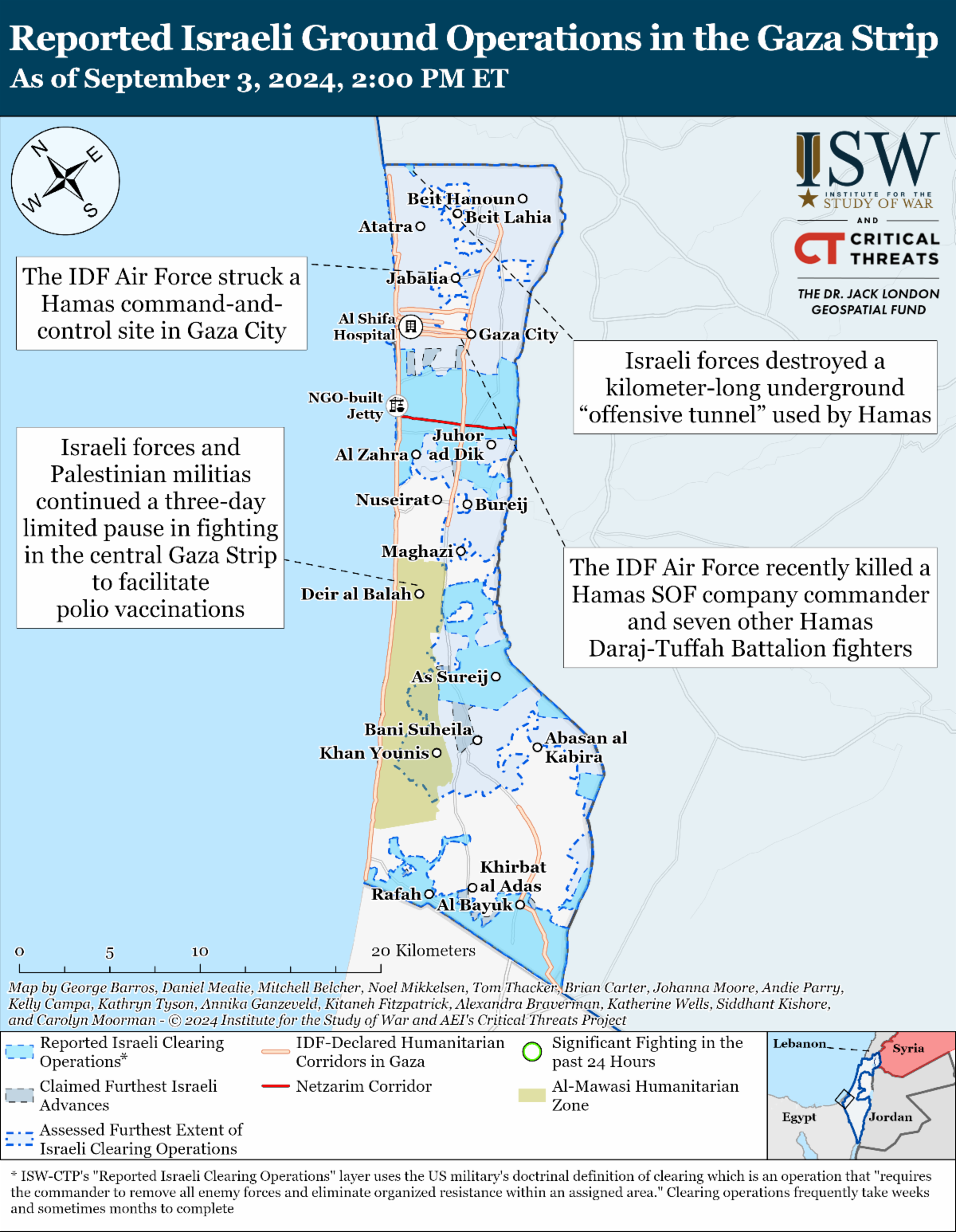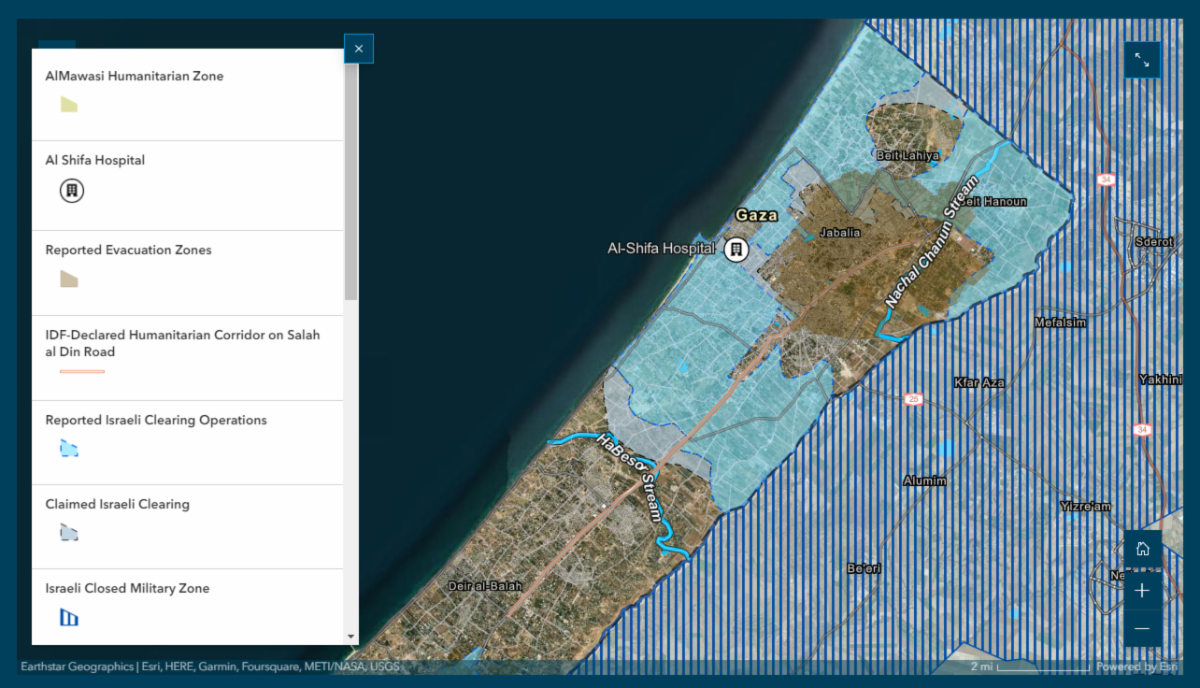Hamas has continued to exploit Israeli hostages in an information operation likely in order to increase pressure on Israel to accept a ceasefire-hostage agreement. Hamas likely calculates that this effort could create more favorable terms for Hamas in such an agreement while weakening the Israeli state. Hamas continued to insist on September 3 that Israel can only secure the release of living hostages through negotiations rather than military operations. Hamas released a propaganda video for the third time since recently killing six Israeli hostages. The most recent video—like the others—featured a recently executed Israeli hostage who called for a ceasefire-hostage agreement. Hamas military spokesperson Abu Obeida separately blamed Israeli Prime Minister Benjamin Netanyahu directly for Hamas killing the six Israeli hostages. Abu Obeida added that Hamas had issued new unspecified instructions for what its fighters who are guarding hostages should do if Israeli forces approach them. Hamas released the hostage propaganda videos and Obeida’s comments in Arabic, English, and Hebrew, indicating that the messages are meant for Israeli, Palestinian, and Western audiences, among others. These messages are meant to undermine domestic and international support for Israeli operations in the Gaza Strip and increase support for a ceasefire-hostage deal that meets Hamas’ demands. Senior Hamas official Mahmoud Mardawi told al Jazeera on September 3 that the release of Israeli hostages in Gaza will only occur through a prisoner exchange deal, which will only be achieved by a total Israeli withdrawal from the Netzarim and Philadelphi corridors. The end of Israeli operations and a complete IDF withdrawal from the Gaza Strip has been one of Hamas’ principal demands since the beginning of negotiations and has since become the greatest hurdle to the talks.
Israeli Prime Minister Benjamin Netanyahu defended and reiterated his plans for a continued Israeli military presence along the Philadelphi Corridor during a press conference on September 3. The press conference comes amid domestic pressure to reach a ceasefire-hostage agreement following Hamas’ execution of six Israeli hostages. Netanyahu said that control of the Philadelphi Corridor is central to Israeli war aims. Netanyahu argued that Israeli disengagement from the Philadelphi Corridor enabled Hamas to become a serious threat in the first place by allowing Hamas to smuggle engineering equipment and weapons into the Gaza Strip. Netanyahu added that “the axis of evil needs the Philadelphi Corridor and, for the same reason, we must control it.” Netanyahu lastly warned that international pressure would make it difficult for Israel to return militarily to the corridor if it withdrew.
US White House National Security Communications Advisor John Kirby said on September 3 that Israel previously agreed to a US-outlined ceasefire-hostage proposal in May 2024 that required the IDF to withdraw from “all densely populated areas,” including around or adjacent to the Philadelphi Corridor. Kirby said that this “essential element” had not changed in subsequent ceasefire-hostage negotiations. Kirby’s comments are not necessarily inconsistent with Netanyahu’s promise to maintain control of the Philadelphi Corridor. Netanyahu has reportedly agreed to withdraw Israeli forces from a one- to two-kilometer section of the Philadelphi Corridor during the first phase of the proposed ceasefire-hostage deal.
Key Takeaways: - Israel-Hamas ceasefire-hostage negotiations: Hamas has continued to exploit Israeli hostages in an information operation to increase pressure on Israel to accept a ceasefire-hostage agreement. Hamas likely calculates that this effort could create more favorable terms for Hamas in such an agreement.
- Gaza Strip: Israeli Prime Minister Benjamin Netanyahu defended and reiterated his plans for a continued Israeli military presence along the Philadelphi Corridor that separates Egypt from the Gaza Strip. Netanyahu said that controlling the corridor is central to Israeli war aims and that withdrawing from the corridor would make it hard for Israel to ever return.
- Lebanon: An IRGC-affiliated outlet published an analytical report examining possible trajectories for fighting between Israel and Lebanese Hezbollah. The report concluded that Israel is unlikely to launch a major military offensive into Lebanon for several reasons, including the imminent threat of an Iranian attack on Israel.
- Iran: Some of the missiles that Iran fired in its large-scale attack on Israel in April 2024 were much less accurate than previously understood. Iran using such missiles in another attack on Israel would increase the risk of an all-out war erupting against Israel and even the United States.
| 






 [ISW] 이스라엘-하마스 전쟁(이란) 업데이트, 2024년 9월 18일
[ISW] 이스라엘-하마스 전쟁(이란) 업데이트, 2024년 9월 18일
 [ISW] 이스라엘-하마스 전쟁(이란) 업데이트, 2024년 8월 31일
[ISW] 이스라엘-하마스 전쟁(이란) 업데이트, 2024년 8월 31일